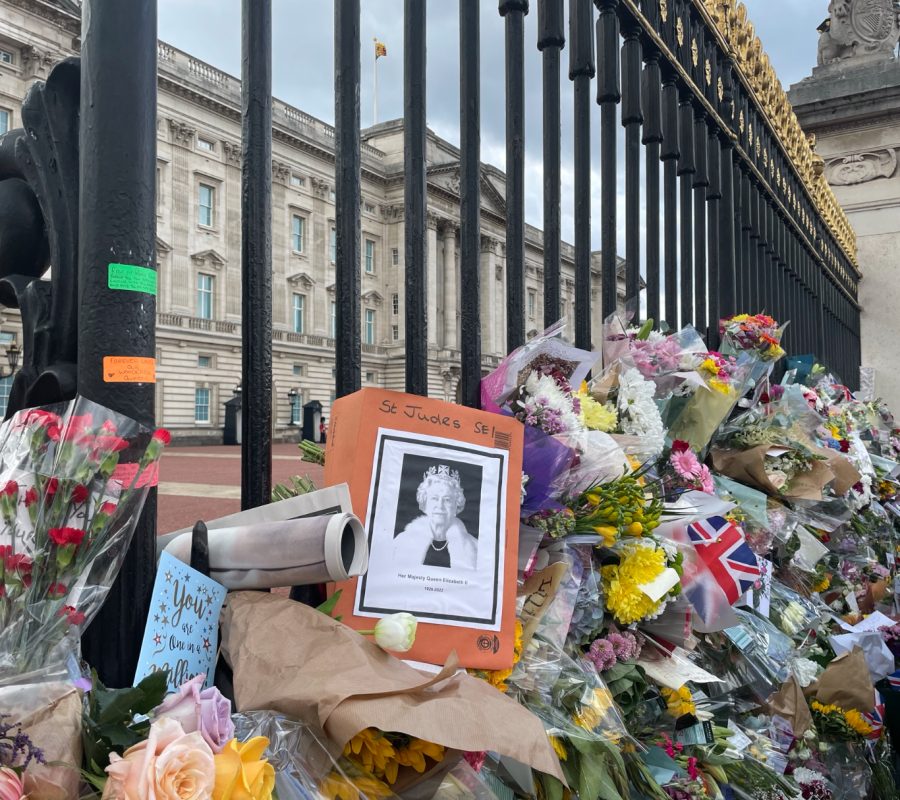A First-Hand Account of the Queen’s Passing
England mourns the passing of the Queen, after her 70-year reign. (Courtesy of Jamison Rodgers/The Fordham Ram)
The day started the same as any other gloomy London morning does. There was a smattering of rain showers throughout the morning, complimented by a cold and dreary outlook for the rest of the day. There was nothing special about the gray clouds that shrouded the city sky or the persistent drizzle that had been lingering from the rainstorm earlier in the week.
That is, until the British Royal Family announced that their longest-reigning monarch was being kept under medical supervision out of concern for her health. To be perfectly honest, I don’t stay up to date on every announcement released to the public by the Royal Family. However, even with my limited knowledge around Royal Family press releases, I was aware that if a statement was being released about the Queen’s health, it must be worse than what was being shared with the public. There was a general understanding in the public that this update was a bracing, fortifying warning.
The news started to trickle out to the public around midday on that fateful Thursday. I had just finished my third day of classes and was starting to feel the rhythm of my new schedule solidify and a sense of familiarity snap into place. This sense of comfort was immediately shattered as it felt like the entirety of the U.K. went on alert, awaiting news on the Queen.
The news channels here in the United Kingdom covered nothing else aside from providing updates on the Queen throughout the afternoon. Twitter was aflutter with a bombardment of media on the Queen. It was the media’s overwhelming focus for the rest of the day. Then close to 6:30 p.m the BBC delivered the news to the public with a somber and methodical tone, broadcasting the update into every home in the United Kingdom, including my own flat.
In the moments following the announcement, it felt as if a veil of silence was slowly lowered over the entire city. Even though there had only been minor visible differences to the look of the city the night of the Queen’s passing, such as every electronic billboard and bus station advertisement being switched to a remembrance of Her Majesty, the current running through the city that night shifted to something of a more somber nature.
In the several days of national mourning that followed, I was able to witness an outpouring of grief among the citizens of the United Kingdom for their beloved Queen. I was able to watch the 96-gun salute, one firing for every year of the Queen’s life, set off in several cities of importance in the U.K., including Edinburgh, Cardiff and a few locations here in London, such as Hyde Park and Tower Bridge.
An even more surreal experience was arriving at Buckingham Palace the day after the news of her death broke. As I entered the gates positioned at the start of the long walkway known as The Mall that would take me to the front of Buckingham Palace, I was struck by the quiet that hung in the air despite the significant crowd gathered. Unsurprisingly, hundreds of bouquets of flowers and notes of condolences were already adorning the gates of the palace when I arrived that afternoon. There was an unmistakable air of grief shrouding London that day.
As an American, I am struck by how devastated the public is about the death of the Queen. But upon further reflection, it seems right that so many are touched by her death. For Americans, our only comparable example to hold beside the Queen is the President. However, the Queen was more of a constant in the lives of the British people than any U.S. president has been in the lives of Americans. This is simply due to the nature and timeline of the two roles. The presidency is built upon temporality and change; the monarchy juxtaposes this position by being something permanent and unchanging.
With so much change happening in the past few years there have been few constants, except for the Queen. Throughout times of change, turmoil, unrest and peace the Queen has been a steady, unyielding force. There is an unnerving feeling of uncertainty now with the loss of that force.
Many people have not known a time when the Queen was not a presence in their lives. There is, of course, a sadness around the feelings of loss for the Queen, but there is also, perhaps, some feelings of grief around the loss of some certainty in their lives. She truly became, what many have iterated since her passing, an honorary member of many of her subjects’ families. The general public will have a chance to pay their respects and grieve over the monarch they loved and respected so much starting on Wednesday.
The haunting melody of “God Save the King” has been sung spontaneously throughout the past week as a way to not only express their collective grief, but as a way to await with bated breath and cautious optimism the beginning of King Charles’ reign.

Jamison Rodgers is from Silver Spring, Md. She is pursuing a major in English, concentrating in creative writing, and a minor in psychology. Jamison started...









































































































































































































Kathleen Kelly • Sep 15, 2022 at 8:39 am
Excellent article. Very nice how you tied your experience of classes into the article
Maureen DiStefano • Sep 14, 2022 at 5:51 pm
Fabulous column Jamison. I am looking forward to being an armchair traveler as you chronicle your time in London.